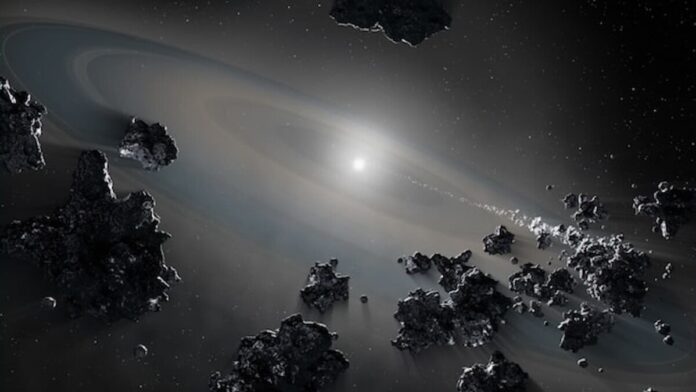
Milky Way residents caught a lucky break this week as astronomers downgraded the chances of a collision with nearby Andromeda to about an even-money proposition. Earlier studies had concluded that the merging of our galaxy with its neighbor was nearly certain.
The new projection came in on Monday by way of a Finnish-led team of scientists. They published their results in Nature Astronomy, after which the Associated Press brought the good news to audiences outside the scientific community.
“As it stands, proclamations of the impending demise of our galaxy seem greatly exaggerated.”
Till Sawala et al, Nature Astronomy.
A coin flip for the fate of our galaxy may still seem alarming to some readers. However, the new research also suggests the collision will be considerably further in the future than previously thought if it happens at all. The timescale for that 50/50 chance is 10 billion years, while the collision was previously thought likely to happen in half that time.
Either way, these are timescales that exceed the lifespan of our own Sun, so there’s no need to start survival prepping quite yet.
But why is it so hard to predict if two things the size of a galaxy will hit each other or not? Surprisingly, the answer’s not all that different from why it’s so hard to guess how the dice will fall in a game of craps.
Of Dice and Galaxies
If you’re a dinosaur like me, you probably watched Jurassic Park growing up. You may remember Jeff Goldblum lecturing the audience on chaos theory as Dr. Ian Malcolm.
In plain terms, a chaotic system is one where a small change in how something started can make a huge difference in how it’s going. The same goes for measurement errors. Although no one is changing the situation in Andromeda or messing with the craps dice mid-roll, it’s impossible to measure their speed and size, etc. with infinite precision. Even if you can to 0.01% accuracy, that tiny bit of uncertainty could be the difference between craps and snake-eyes—or between galactic catastrophe and a near miss.
- Read More: Politician Places Long Odds Bet on Himself
- Read More: VGW Going Private: A Strategic Move Against US Regulatory Headwinds and Shareholder Disputes
For dice, the chaos comes from bouncing off their sharp corners and edges. For gravitational systems like galaxies, anything with three bodies or more is chaotic. You probably don’t need to be an astronomer to know that there are more than three stars in the Milky Way and Andromeda. (For non-dinosaurs, The Three-Body Problem on Netflix may be a more familiar reference point than Jurassic Park.)
There are a few ways to try to tame chaos. You can take better measurements, but there are limits to that. You can predict less far in the future, but that’s not helpful when talking about a potential collision billions of years from now. Or, you can embrace uncertainty and make statistical predictions.
Monte Carlo Simulations: Gambling for Science
The connection between that and gambling isn’t just my own observation. The standard way to do research like this is called the Monte Carlo method, named for the famous Monte Carlo casino in Monaco.
If you suspect a die is loaded, one of the easiest ways to test it is to roll it a lot of times and count the results. Similarly, it may be possible to calculate a game’s odds mathematically, but you could also just play it over and over until you determine the probability that way.
The same principle applies to physics models in the face of poor measurements and a chaotic system. Run your simulation again and again, changing the inputs randomly each time, within the general range that you’ve measured. Eventually, the odds will start to emerge.
Asteroids: a More Immediate Problem
If the Milky Way does merge with Andromeda, astronomers have proposed the name “Milkomeda” for the resulting galaxy. But in all likelihood, there won’t be anyone around to call it that.
That far in the future, the possibilities of a galactic collision feel pretty abstract. However, astronomers also apply Monte Carlo methods to a more concrete problem: the likelihood of a big asteroid impacting the Earth.
These collisions happen on a regular basis, but most of them are pretty small. There’s a direct connection between impact size and frequency. Asteroids like the one we think wiped out the dinosaurs mercifully come only about once every 100 million years. On the other hand, a football-field sized one might come once in 1000 years, and even that would be pretty bad to have land on you unexpectedly.
Can We Predict and Avoid Asteroid Impacts?
Scientists can model asteroids better than they can galaxies, because they’re only looking a few years ahead. On the other hand, there are other problems, like the fact that are probably about a billion of them, most of which are hard to spot at a distance against the darkness of space. We’re getting better at spotting asteroids, but we still only have tabs on about 36,000 of them. And as of last September, we’ve only ever detected nine collisions before they happened.
Even when we have our telescopes on an asteroid, there’s a lot of chaos involved in mapping its trajectory. That’s because they don’t weigh very much compared to other things in the Solar System, like planets, moons, and other, larger asteroids. A close approach to any of those things can deflect an asteroid quite a bit. Again, a small difference in how close the encounter is can radically change the asteroid’s resulting path.
New advancements in Monte Carlo simulation are being made on an ongoing basis, in the hopes that we might one day be able to predict a dangerous asteroid strike before it happens. Meanwhile, there are also experiments being done on how to deflect one if we do spot it. In the meantime, every day is a gamble against the universe.
So, next time you’re at the roulette table struggling to decide on a bet, consider this: at least you’re only trying to predict a tiny silver ball, not a thousand-ton space rock. And all that’s at stake is a bit of money.







